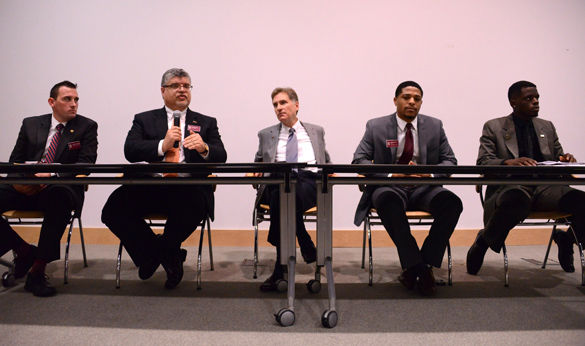State leaders back bill to enforce balanced budget
January 18, 2016
As the stalemate between Illinois lawmakers and the executive branch continues into its seventh month, members of the minority Republican Party in the Illinois House have introduced a bill that would suspend payment to state leaders if a balanced budget is not passed at the beginning of every fiscal year.
The bill would require the auditor general to review and determine whether or not an enacted state budget is balanced within 30 days of passing and authorizes the state’s comptroller to stop salary payments to members of the Illinois General Assembly otherwise. It would also force lawmakers to convene for a special session if the budget becomes unbalanced at any time during the fiscal year.
“The Illinois Constitution requires a balanced budget be passed. The problem is, there are no consequences now if this does not happen,” Rep. Terri Bryant, R-Murphysboro, said in a press release. “The idea behind this bill is simple: I say, if the politicians don’t pass a balanced budget, they should not get paid.”
Advertisement
A call to Bryant’s office went unreturned as of Monday afternoon. John Charles, SIU’s executive director of governmental affairs, said the university is not taking an official position on the bill.
Interim Chancellor William Bradley Colwell said the type of “heavy-handed” legislation proposed by Bryant and 11 other Republican sponsors could negatively impact funding for higher education in future budget agreements.
“Under the current leadership in Springfield it is very possible higher education would have come out on the wrong end of this,” Colwell said.
Republican Gov. Bruce Rauner’s initial budget proposal called for a more than 30 percent cut to the operating budgets of Illinois’ public universities; a measure SIU President Randy Dunn told the Daily Egyptian in February would be “severely detrimental to the campus operations.”
About 90 percent of the state budget has been paid out through court order and state law, but public universities have yet to see any appropriations from the state.
“It’s just a shame that it’s come to this,” Colwell said of the longest budget impasse in state history.
The lack of state funds has put some public universities in danger of closing their doors. SIU is not currently in that situation, Colwell said.
Advertisement*
“We have no intention of closing,” he said. Dunn has reiterated that sentiment over the last few months.
MORE: Funding for MAP gets traction in Springfield | Trustees ask state leaders to pass budget
And as the bills are piling up for some cash-strapped institutions in the state, recent statements issued by Rauner do not suggest a painless resolution. A memo sent from Rauner’s administration to the Illinois Senate last week condemned public universities for alleged fiscal irresponsibility.
“I’d love to show [Rauner] our data,” Colwell said of the memo. “Of the things that we can do, we’re doing them.”
Budget cuts were made in anticipation of reduced state aid during fall 2015. The university is considering other sources of revenue that would require legislative action from the state, including borrowing internally and liquidating some real estate assets, Colwell said.
But even if the university receives a marginal revenue increase, Colwell said that plus budget cuts and student tuition dollars alone won’t be enough to sustain SIU forever.
“At some point, we do need the state to do their part,” Colwell said.
Bill Lukitsch can be reached at [email protected] or at (618) 536-3329.
Advertisement









